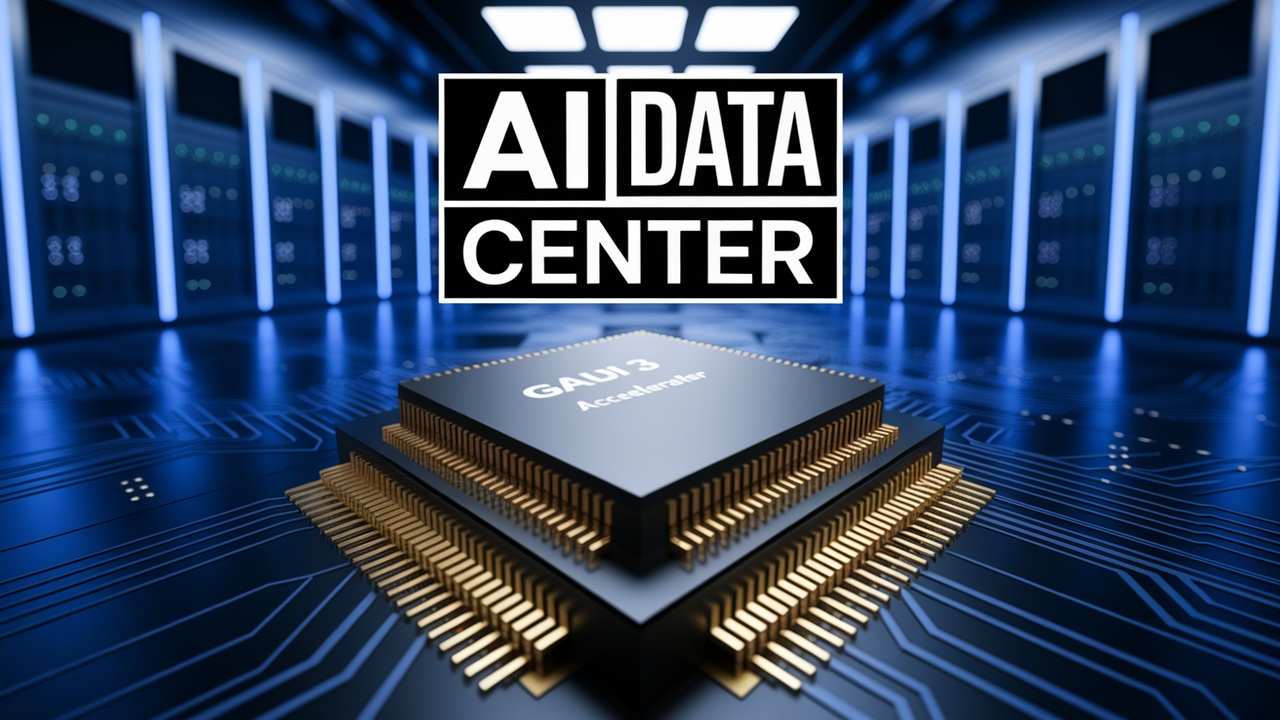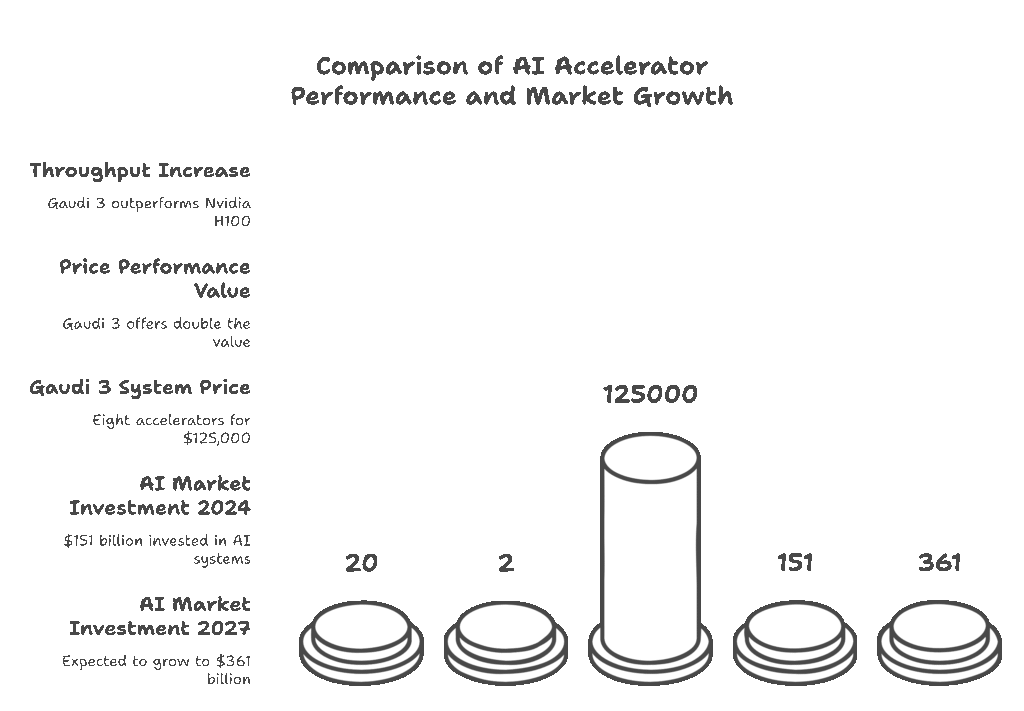Intel introduces Xeon 6 and Gaudi 3 AI Accelerators for rapid AI growth.
SANTA CLARA, Calif. In September 24th 2024 at a virtual event Intel rolled out the Xeon 6 processors and Gaudi 3 AI accelerators.

These chips are put forth to improve speed, reduce costs, and increase efficiency for data centers and businesses. Intel’s play also sees them take a larger role in the fast growing AI market which they are competing in with Nvidia and AMD.
Major Improvements.
The Xeon 6 processors in the Granite Rapids series which feature Performance-cores (P-cores) see a two fold increase in power from their predecessors. We see up to 128 cores, double the memory speed, and in built AI tools for tasks such as data analysis and AI processing. Additionally, the latest Xeon 6 architecture is designed to optimize workloads effectively. Also out is the Gaudi 3 which we note is built for large scale AI tasks, it includes 64 Tensor cores, eight matrix engines, and 128 GB of HBM2e memory. These features put Gaudi 3 at the top of the class for deep learning and generative AI.

Intel reports that Gaudi 3 outperforms Nvidia’s H100 in some of our tests which see 20% more throughput and twice the price performance value from Gaudi 3. A Gaudi 3 system which includes eight accelerators sells for $125,000 which is about two thirds the price of the competition. The AI market is a hot field at present with companies putting $151 billion into AI systems in 2024 which is expected to grow to $361 billion by 2027 according to McKinsey. Xeon 6 and Gaudi 3 AI accelerators are it’s solution for that growth with flexible and scalable options for cloud and edge computing.
Xeon 6 and Gaudi 3 AI accelerators which open new markets for businesses to scale AI with speed and efficiency reports Justin Hotard, Intel’s executive vice president and general manager of the Data Center and Artificial Intelligence Group. We are rolling out an open platform which also reduces costs and improves performance.
Why Now? A Competitive AI Race
Intel has put out Xeon 6 and Gaudi 3 AI accelerators as we see AI transform industries. Nvidia which has the greater than 80% share of the AI accelerator market at present while AMD’s EPYC chips are to that which Intel has been dominant in the CPU space. Intel’s new chips are to go after high core counts and lower power use. Xeon 6 for example brings to the table 4.2 times the performance per rack of what we saw in second generation Xeons which is great for data centers looking to play with space and energy.
The Gaudi 3 AI accelerators are breaking in. In April 2024 IBM Cloud which was first in line to use them did. Also reports by Signal65 which note Gaudi 3 outperforms Nvidia’s H100 and H200 in the performance of models like Llama-3.1. Also we see that Intel is working with Dell Technologies and Supermicro to build custom AI solutions which in turn report that 73% of GPU accelerated servers use Xeon CPUs. These partnerships which also include the push of Xeon 6 and Gaudi 3 AI into more businesses.
Facing Challenges, Seizing Opportunities
The out look for Xeon 6 and Gaudi 3 AI accelerators is not good. Gaudi 3 sales have fallen short of what Intel was hoping for, they missed the 2024 marks according to TechInsights. Also Intel is to put an end to the Gaudi line with Gaudi 3 which in turn puts into question their long term AI accelerator plan. AMD’s new EPYC chips and Nvidia’s Blackwell GPUs will continue to put pressure on Intel to do better.
Still, Xeon 6 and Gaudi 3 AI accelerators present large opportunity. They have an open design which works with many software platforms, which in turn appeals to companies that are after affordable AI solutions. Intel’s work with SeekrFlow and changes to PyTorch 2.4 improve what developers can do with these chips. As AI requirements grow Intel’s focus on speed and cost will win over data centers and cloud providers looking for the best value.
Next Steps for Intel’s AI Push
Intel has put out the Xeon 6 and Gaudi 3 AI accelerators which positions the company to play in the AI growth. Also in Q1 2025 we will see the roll out of mid range Xeon 6 models like the 6700P and 6900E which will expand out product range. For Intel’s success to be had we see them get more cloud players and business to adopt these chips. If Xeon 6 and Gaudi 3 AI accelerators do what they should do we may see Intel take a stand against Nvidia and AMD’s dominance.
Moreover, Xeon 6 processors are expected to drive innovation in AI, enabling businesses to harness advanced analytics for better decision-making.
As the demand for AI solutions escalates, Xeon 6 and Gaudi 3 AI accelerators will play a crucial role in shaping the future of AI technology.
However Intel has to act quickly. They saw their stock drop 43.6% which is behind the industry’s 51.1% growth. Xeon 6 and Gaudi 3 AI accelerators will have to prove themselves in the real world if Intel is to turn things around. If Intel puts forward competitive and open AI solutions which they push forward we may see a market shift.
References:
- Intel Official Press Release
- IBM Cloud Gaudi 3 Adoption
- AI Market Growth Forecast
- Gaudi 3 Benchmark Results
- Intel’s AI Ecosystem
Samsung Launches Galaxy S25 Edge in India with Titanium Frame and 200MP Camera